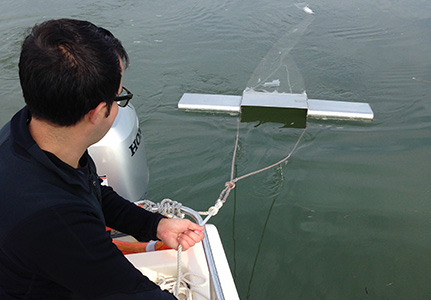Tiny plastic balls too small to see, fragments of plastic bottles, plastic pellets used in manufacturing-they're all in San Francisco Bay. It's an invisible problem that harms swimmers and sea life, but help is on the way.

Baykeeper Staff Scientist Ian Wren, on the Baykeeper pollution patrol boat, uses a device called a manta trawl to collect samples of plastic microbead pollution in San Francisco Bay. Photo by Meg Sedlak, San Francisco Estuary Institute
By Sejal Choksi-Chugh
Published: October, 2015
Tiny plastic balls too small to see, fragments of plastic bottles, plastic pellets used in manufacturing—they’re all in San Francisco Bay. It’s an invisible problem that harms swimmers and sea life, but help is on the way.
In a victory for a cleaner Bay, a new law passed by the California Legislature bans one major source of this pollution—plastic microbeads in personal care products. As Bay Crossings went to press, Governor Jerry Brown was expected to sign the ban into law.
Microbeads are tiny balls of plastic used in facial scrubs, shampoo, soap, toothpaste, eyeliner, lip gloss, deodorant and sunblock. When these products are washed down a sink or shower drain, they are too small to be filtered out by wastewater treatment plants—so treated wastewater carries the microbeads into the Bay.
Once in the Bay, these tiny bits of plastic absorb toxic contaminants such as pesticides and PCBs. The Bay’s smallest fish and other creatures eat the toxin-laden microbeads, which resemble plankton, one of their main food sources. Bigger fish and water birds eat the smaller fish and creatures. Eventually, the toxic chemicals get concentrated in fish that people eat. Open-water swimmers can also swallow microbeads.
California’s ban on microbeads starts in 2020, but microbeads may be gone sooner. In response to bans in our state and others, many manufacturers are already reformulating their products. In the meantime, you can help keep microbeads out of San Francisco Bay by avoiding any product with an ingredient list that includes polyethylene (PE), polypropylene (PP), polyethylene terephthalate (PET), polymethyl methacrylate (PMMA) or nylon. Safe alternative ingredients that provide scrubbing include ground apricot shells and cocoa beans.
San Francisco Baykeeper helped draft California’s microbead ban, and we advocated for its passage along with our environmental partners, Clean Water Action and 5 Gyres. The law makes manufacturers take more responsibility for the environmental impact of their products.
The ban comes at a critical time. High levels of microbeads and small plastic particles are found in the Central and South Bay, according to new study conducted by the San Francisco Estuary Institute—who had help with sample collection from Baykeeper and our pollution patrol boat. The study also found high levels of pellets called nurdles that are used in the manufacture of plastic products.
Nurdle plastics get into the Bay when they are spilled or scattered in outdoor areas of manufacturing facilities. Once in the open, plastic pellets can be blown or washed into tributaries or storm drains that lead to the Bay. Baykeeper is investigating Bay Area industrial facilities to determine which are responsible for plastic pellet pollution and to take action to stop it.
Other sources of plastic particles in the Bay include larger items that have broken down into fragments, including cigarette filters, plastic bottles and Styrofoam.
Plastic particles in San Francisco Bay can and do get washed into the Pacific Ocean. And ocean pollution from plastic—from tiny microbeads to plastic bags to large plastic items—is at crisis levels. Scientists report that 90 percent of sea birds have eaten plastic. Keeping plastic pollution out of the Bay not only makes our local waters healthier and safer, it also reduces plastic pollution in the world’s oceans. To learn more about Baykeeper and support our work, please visit www.baykeeper.org/donate.
Sejal Choksi-Chugh is the Executive Director of San Francisco Baykeeper. Baykeeper uses on-the-water patrols, science, advocacy and the courts to stop San Francisco Bay pollution. To report pollution, call Baykeeper’s hotline at 1-800-KEEP-BAY, e-mail hotline@baykeeper.org, or click “Report Pollution” at www.baykeeper.org.

